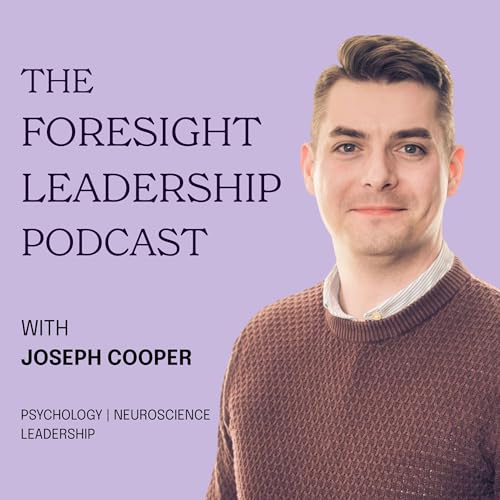
The Foresight Leadership Podcast
カートのアイテムが多すぎます
カートに追加できませんでした。
ウィッシュリストに追加できませんでした。
ほしい物リストの削除に失敗しました。
ポッドキャストのフォローに失敗しました
ポッドキャストのフォロー解除に失敗しました
-
ナレーター:
-
著者:
-
Joseph Cooper
このコンテンツについて
What if leadership wasn’t about authority - but about awareness? The Foresight Leadership Podcast helps ambitious leaders elevate their impact by mastering the psychology, neuroscience, and emotional intelligence that drive authentic leadership effectiveness.
Hosted by Joseph Cooper, a strategic commercial leader turned educator, this podcast explores how to build credible leadership presence, inspire collaboration, and lead with self-awareness and integrity in a world where uncertainty is the only constant.
Through evidence-based insights, reflective storytelling, and thought-provoking analysis, Joseph brings research to life - unpacking the science behind trust, motivation, and influence. Each episode distils findings from psychology and neuroscience into practical, human-centred leadership wisdom you can apply immediately.
Expect deep, honest conversations about:
- Leadership effectiveness and the habits that shape high-impact leaders
- Psychological safety and building cultures of trust and innovation
- Conflict resolution through emotional intelligence and cognitive empathy
- Authentic influence - leading with presence, purpose, and humility
- The neuroscience of decision-making and performance under pressure
Whether you’re an emerging leader ready to be recognised for your potential, or a seasoned executive seeking renewed clarity and connection, this podcast helps you think differently about leadership - not as a role you perform, but as a consciousness you cultivate.
Keywords: leadership podcast, authentic leadership, neuroscience of leadership, psychology of leadership, emotional intelligence, leadership effectiveness, executive presence, leadership development, self-awareness, leadership coaching, foresight, organisational culture, team leadership, psychological safety, personal growth for leaders.
Foresight Leadership Group © 2025-
 59 分
59 分カートのアイテムが多すぎます
ご購入は五十タイトルがカートに入っている場合のみです。カートに追加できませんでした。
しばらく経ってから再度お試しください。ウィッシュリストに追加できませんでした。
しばらく経ってから再度お試しください。ほしい物リストの削除に失敗しました。
しばらく経ってから再度お試しください。ポッドキャストのフォローに失敗しました
ポッドキャストのフォロー解除に失敗しました
-
 58 分
58 分カートのアイテムが多すぎます
ご購入は五十タイトルがカートに入っている場合のみです。カートに追加できませんでした。
しばらく経ってから再度お試しください。ウィッシュリストに追加できませんでした。
しばらく経ってから再度お試しください。ほしい物リストの削除に失敗しました。
しばらく経ってから再度お試しください。ポッドキャストのフォローに失敗しました
ポッドキャストのフォロー解除に失敗しました
-
 1 時間 3 分
1 時間 3 分カートのアイテムが多すぎます
ご購入は五十タイトルがカートに入っている場合のみです。カートに追加できませんでした。
しばらく経ってから再度お試しください。ウィッシュリストに追加できませんでした。
しばらく経ってから再度お試しください。ほしい物リストの削除に失敗しました。
しばらく経ってから再度お試しください。ポッドキャストのフォローに失敗しました
ポッドキャストのフォロー解除に失敗しました


